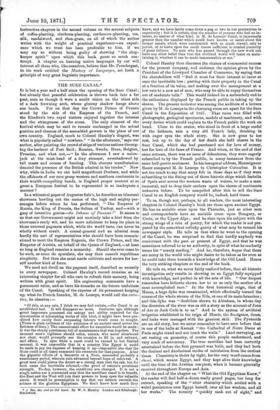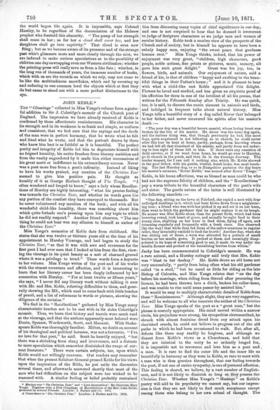THE SUEZ CANAL.* IT is but a year and a
half since the opening of the Suez Canal ; but already that peaceful celebration is thrown back into a far past, seen as though it were a sunlit vision on the other side of a dark frowning arch, whose gloomy shadow hangs above our heads. For on that day the Crown Prince of Prussia stood by the side of the Empress of the French, and the Khedive's two royal visitors enjoyed together the interest and the strangeness of the scene. The only element of the
fe,stival which may be said to remain unchanged in the actual
position and chances of the assembled powers is the place of our own country. England, much to Colonel Hamley's disgust, was what is popularly called "nowhere." "In the afternoon," says our author, after painting the crowd of ships of various nations throng- ing the harbour of Port Said ; Russian, Swede, Dane, Belgian, Prussian, and what not,—" In the afternoon I saw a union- jack at the mast-head of a tiny steamer, overshadowed by tall masts and oceans of bunting. This obscure manifestation denoted the presence of the British admiral in his tender." Now why, while in India we can hold magnificent Durbars, and while the offshoots of our race grasp western and southern continents in their wealth-compelling hands, is England proper content at so great a European festival to be represented in so inadequate a manner ?
In a whimsical paper of Augustus Sala's, he describes an itinerant shown:tan bawling out the names of the high and mighty per- sonages before whom he has performed, "The Emperor of Roosia, the King of Proosia, the Sultan of Turkey, and—with a gasp of inventive genius—the Isthmus of Panama !" It seems to us that our Government might not unwisely take a hint from the showman's ready wit, and be more solicitous to keep its place in those external pageants which, while the world lasts, can never be wholly without result. A consul-general and an admiral seem hardly the sort of representatives who should have been commis- sioned to meet the Empress Eugenie, the Crown Prince, and the Emperor of Austria, on behalf of the Queen of England,—at least so long as England remains a monarchy. Should she ever cease to be such, as some do speculate, she may then consult republican simplicity. But then she must needs cultivate and secure for her- self another kind of force.
We need not dwell on the pageant itself, described so recently In every newspaper. Colonel Hamley's record remains as an interesting chapter for all who care to refresh their memory, being written with great spirit. His engineering comments have a
permanent value, and so have his remarks on the future usefulness of the Canal. Speaking of the expense of its permanent keeping up, what its French founder, M. de Lesseps, would call the entre-
tien, he observes :—
"Of this, at any rate, I think we may feel certain,—the Canal is an established fact. It will disappear no more. Centuries ago, although great improvers possessed the energy and ability required for the .construction of astonishing works of this kind, it might have been pre- dicted how surely their surpassing labours would coma to nought. (There is plain evidence of the existence of an ancient canal across the Isthmus of Suez.) The concentrated effort for execution would be made ; it was the steady continuous toil of maintenance that was hopeless. The moment man's vigilance should relax, nature, who never slumbered nor slept, would promptly use the occasion to fill in' and exhaust, and efface. In ages when a canal could be turned to but limited account it was impossible that in a country like Egypt it could be made to pay the expense of keeping it up—impossible also that the State could at all times command the resources for that purpose. After the gigantic efforts of a Sesostris or a Neco succeeded probably a reactionary period, wherein ruin advanced beyond hope of retrieval. A great man could pierce the desert as a strong man rent the oak, but for both came the inevitable rebound,—the proof of nature's persistent strength. To-day, however, the conditions are changed. It is not a single nation nor a contracted area that the maritime canal is to benefit, the East and the West will join their powers to keep open the valuable strait. It would be presumption to say that our science exceeds the science of the glorious Egyptians. We don't know how much they -* A New Sea and an Old Land. By W. G. Hamley. London and Edinburgh : Blackwood.
knew, and we have lately come down a peg or two in our pretentious to superiority; but it is certain that the number of persona who feel an in- terest, no matter of what kind, in M. de Lesseps' Canal, is immensely greater than the number which could have known or cared about the former canals, which were constructed with so much travail, only to perish, or to leave upon the earth traces sufficient to remind posterity of great failures. No man who has passed through the new work can have any other belief than that the civilized world will insist on main- taining it, whether it can be made remunerative or not."
Colonel Hamley then discusses the chance of commercial success for the present company, and endorses the opinion given by the President of the Liverpool Chamber of Commerce, by saying that
the shareholders will "find it most for their interest to incur at once the inevitable loss ; parting with their property in the Canal at a fraction of its value, and making over the management at a low rate to a new set of men, who may be able to repay themselves out of moderate tolls." This would indeed be a melancholy end to
the enthusiasm displayed by the French public in taking up the shares. The present reviewer was among the auditors of a lecture given by M. de Lesseps in the charming room set apart for the Suez Canal in the Exposition of 1867. That room was filled with photographs, geological specimens, models of machinery, and with every device which could explain to the French public the work on hand. Close to the orator, who stood in front of a large model of the Isthmus, sate a very old French lady, drinking in with eager eyes the whole story. She is now gone to her rest, but up to the day of her death she held shares in the Suez Canal, which she had purchased not for love of money, but for love of the fame of France. And when, at the end of that same autumn, there was an issue of debentures, they were eagerly subscribed to by the French public, in many instances from the same half-poetic sentiment. In his inaugural address, Monseigneur Bauer compared M. de Lesseps to Christopher Columbus. It is not too much to say that many felt in those days as if they were subscribing to the fitting out of those historic ships which Isabella of Spain sent across the western waste of waters, to make a man immortal, and to drop their anchors upon the shores of continents unknown before. To be compelled after this to sell the Suez Canal to an English company would be, indeed, hard times.
To us, though not, perhaps, to all readers, the most interesting chapters in Colonel Hamley's book are those upon ancient Egypt.
He has an amiable craze upon the Pharaohs, just as other men and correspondents have an amiable craze upon Hungary, or Crete, or the Upper Alps ; and he rises upon his subject with the
strong wings of a vein of poetry, for which the reader is not pre- pared by the somewhat rollicky gaiety of what may be termed his newspaper style. He tells us that when he went to the opening of the Canal, he was surprised to find that hardly anybody was conversant with the past or present of Egypt, and that he was sometimes referred to as an authority, in spite of what he modestly
terms his "scanty reading." And he, therefore, hopes that there are many in the world who might desire to be taken as far even as he could take them towards a knowledge of the Old Land. Hence the very striking chapters at the end of the book.
He tells us, what we never fairly realized before, that all historic
investigation only results in showing us an Egypt fully equipped with knowledge, and perfect in all the arts of life. "Our deepest researches have hitherto shown her to us as only the mother of a most accomplished race." In the first historical reign, that of Menes, a huge dyke was constructed, which effectually turned the course of the whole stream of the Nile, or one of its main branches ;
and this dyke was "doubtless shown to Abraham, in whose day the diversion of the river was as old a story as the account of Joan of Arc or Jack Cade is to us." And in the system of artificial irrigation established in the reign of Moeda, the floodgates, dams,
and locks were managed with the greatest skill. The Pyramids are an old story, but we never remember to have seen before that in one of the halls at Karnak "the Cathedral of Notre Dame at Paris might stand and not touch the walls." Land surveying, an art resting on geometry, of course this people understood, and very much of astronomy. The true meridian had been correctly ascertained before the first pyramid was built, and they had both the decimal and duodecimal modes of calculation from the earliest times. Chemistry is theirs by right, for the very word comes from chemi, which means Egypt, and they kept alive their knowledge
until the time of the Arabian conquest, when it became generally received throughout Europe and Asia.
At the end of the chapter on "What the Old Egyptians Knew,"
the reader will find half-a-dozen really grand pages, too long for extract, speaking of the "utter obscurity which settled with a weird persistence over Egypt herself, over all her wisdom, and all her works." The country "quickly sank out of sight," and
the world began life again. It is impossible, says Colonel Hamley, to be regardless of the denunciation of the Hebrew prophet who foretold this obscurity. "The pomp of her strength shall cease in her ; as for her a cloud shall cover her, and her daughters shall go into captivity." That cloud is even now fting ; but as we become aware of its presence and of the strange past which glimmers more and more clearly through the mist, we are induced to make curious speculations as to the possibility of oblivion one dayenwrapping even our Western civilization; whether the printing-press will really save us from a like fate ; whether, in the long ran of thousands of years, the immense number of books, which with us are the records on which we rely, may not come to be like the multitudinous snowflakes, which end by covering up and reducing to one common level the objects which at first they do but cause to stand out with a more perfect distinctness to the eye.



































 Previous page
Previous page